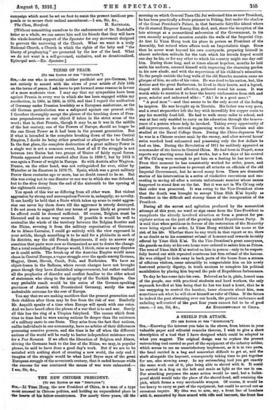THE NEW CHINESE PRESIDENT.
[To THE EDITOR Or THE " 8PECTITent."1
gm—Li Yilan Hung, the now President of China, is a man of a type most unusual in Chinese politics, and holding an unparalleled place in the hearts of his fellow-countrymen. For nearly three years, till the
morning on which General Than Chi Jui welcomed him as new President, he has been practically a State prisoner in Peking, first under the shadow of the Great President's Palace, in that fantastic fairylike island where the ill-starred Emperor Kuang Heil died, and, since the inception of the late attempt at a monarchical subversion of the Government, in his own recently acquired mansion outside the walls of the Imperial City. At first Li Yuan Hung took his place in person as President of the Assembly, but retired when affairs took an Imperialistic tinge. Sines then he never went beyond his own courtyards, preparing himself in almost unbroken solitude for the task which his friends hoped would one day be his, or for any other to which his country might one day call him. During those long, and at times almost hopeless, months he laid aside his uniform, amused himself with improving the charming garden in his new abode, and with the super-vision of his children's education. To the people outside the long walls of the old Manchu mansion came no glimpse of him, no echo of his voice. Ho was dead to his nation, but, like Arthur and the great Barbarossa, he lived in their hearts, and a legend, tinged with pathos and affection, gathered round his name. It was worth while to mention it to hear the hearty exclamation from rich and poor, scholar and unlearned alike : " Ah I he is a good man I "
" A good man"—and that seems to be the only secret of the feeling he inspires. He was brought up in Tientsin. His father was very poor, and a cruel stepmother left the boy with incredibly few copper cents to pay his monthly food-bill. He had to walk many miles to school, and was at last only enabled to carry on his education through tho benevo- lence of a patron whose help he invoked. Taking every opportunity of self-improvement, he entered engineering works in Tientsin and also studied at the Naval College there. During the Chino-Japanese War he was in a Chinese cruiser sunk by the enemy, and after several hours' swim reached land exhausted and possessing only the few dollars he had on him. During the Revolution of 1911 he suddenly appeared as commander of the forces in Central China. He had been in Hapeh, some reports say starting some kind of works, but a few days of his control of Wu Ch'ang were enough to put him on a footing ho has never lost. From that moment he has consistently worked for order, peace, and justice. He was powerless to prevent all attacks on officials of the old Imperial Government, but he saved many lives. There are dramatic, stories of his intervention in a series of vindictive executions and sue- ceeding in saving all after a certain unfortunate number whose names happened to stand first on the list. But it was not in Wu Ch'ang only that order was preserved. It was owing to the Vice-President alone that the South was brought to accept Yuan Shih K'ai loyally as President in the difficult and stormy times of the inauguration of the President.
Daring ail the Rarest and agitation produced by the monarchist attempt of this year, no word or sign came from the Vice-President to complicate the already involved situation or form a pretext for pre- cipitate action on the part of the growing united Republican Party. It is said that -when petitions in favour of the restoration of the Monarchy were being signed to order, Li Yuan Hung withheld his name at the risk of his life. Whether there be any truth in that report or no, there is no doubt as to his consistent refusal of honours and rewards lavishly offered by Yuan .Shih Khd. To the Vice-President's great annoyance, the guards en duty at his own home were ordered to salute him as Prince. The sons of Yuan Shih K'ai waited ou him in person—only to be respect- fully bowed out with repeated courteous but firm refusal of the honour. He was obliged to hide away in back parte of the house from a stream of officious visitors, come ostensibly to congratulate him on his newly bestowed princely dignity, in truth anxious to complete his political annihilation by placing him beyond the pale of Republican forbearance.
To-day he has come into his own. Beloved as he is, plain, honest man of the people, one with practical students and hard workers, the only reproach levelled at him being that he has too kind a heart, that he is tee easygoing to control the harsher, baser elements about him, men sometimes ask what he will show himself as ruler of China. If the future be indeed the past streaming over our heads, the patient endurance and unfailing self-control of the past four years cannot fail to be of good






























 Previous page
Previous page